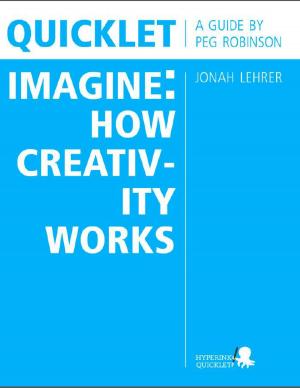Quicklet on Criminal Minds Season 1 (CliffsNotes-like Summary, Analysis, and Commentary)
Nonfiction, Reference & Language, Study Aids, Book Notes, Art & Architecture, General Art| Author: | Charles Limley | ISBN: | 9781614640905 |
| Publisher: | Hyperink | Publication: | March 2, 2012 |
| Imprint: | Hyperink | Language: | English |
| Author: | Charles Limley |
| ISBN: | 9781614640905 |
| Publisher: | Hyperink |
| Publication: | March 2, 2012 |
| Imprint: | Hyperink |
| Language: | English |
ABOUT THE BOOK
Criminal Minds first aired on CBS, and ran from September 22, 2005 until May 10, 2006. For the initial season, the program was produced jointly by The Mark Gordon Company, Touchstone Television, and Paramount Television. CBS.com cites Erica Messer as “the Showrunner and longest serving writer on Criminal Minds” (Criminal Minds: Cast). Along with Messer, Criminal Minds Season 1 was produced and directed largely by Mark Gordon and Ed Bernero (Variety, Criminal Minds).
Criminal Minds follows an elite team of FBI criminal analysts, known as the Behavioral Analysis Unit (BAU), as its members travel the country working to solve grisly murder mysteries and arrest the serial killers responsible for them.
Criminal Minds premiered amid a rush of other crime-solving programs such as CSI: Crime Scene Investigation, Crossing, Law & Order: SUV, and Medium, many of which were also broadcast on CBS. Given this context, the immediate task for Criminal Minds—the latest newcomer to the television-crime-scene-investigation craze—was to somehow set itself apart from the crowd. To accomplish this, the show relied on both its cast of actors and its focus on psychological profiling.
MEET THE AUTHOR
Charles Limley is a native of Colorado. After earning bachelor’s degrees in both English Literature and Humanities from the University of Colorado—Boulder, he entered the world of professional writing. He began his work with Hyperink during the fall of 2011. In addition to writing, Limley is an avid reader. He also loves bicycles, and has completed several long-distance bicycle tours.
EXCERPT FROM THE BOOK
In portraying these crimes, each episode of Criminal Minds becomes its own mini-narrative placed within a larger overall story in which the BAU team works together to become not only a professional team, but a personal team as well. As the season unfolds, characters’ personal struggles, fears, and doubts are revealed, and as they are, teammates must figure out how best to help each other. In this way, the members of the BAU team are constantly focused on providing relief and help to those in need, despite being surrounded by a world of deranged, senseless, and bloody killings.
This fundamental theme is attested to by Agent Gideon in episode 6, “L.D.S.K.,” when he reminds Agent Reid that for a psychological profiler, the “most effective weapon is the ability to empathize—to humanize an unsub’s victim” (TV.com, Criminal Minds: Episode Guide).
Gideon tells Reid that only by reversing the dehumanizing effects of crime and murder, returning to the victims their dignity and worth as individuals, can an effective and accurate profile of the perpetrator be constructed. Thus, solving crimes and arresting serial killers is ultimately an act of recognizing and maintaining the value inherent in each individual victim...
Buy a copy to keep reading!
ABOUT THE BOOK
Criminal Minds first aired on CBS, and ran from September 22, 2005 until May 10, 2006. For the initial season, the program was produced jointly by The Mark Gordon Company, Touchstone Television, and Paramount Television. CBS.com cites Erica Messer as “the Showrunner and longest serving writer on Criminal Minds” (Criminal Minds: Cast). Along with Messer, Criminal Minds Season 1 was produced and directed largely by Mark Gordon and Ed Bernero (Variety, Criminal Minds).
Criminal Minds follows an elite team of FBI criminal analysts, known as the Behavioral Analysis Unit (BAU), as its members travel the country working to solve grisly murder mysteries and arrest the serial killers responsible for them.
Criminal Minds premiered amid a rush of other crime-solving programs such as CSI: Crime Scene Investigation, Crossing, Law & Order: SUV, and Medium, many of which were also broadcast on CBS. Given this context, the immediate task for Criminal Minds—the latest newcomer to the television-crime-scene-investigation craze—was to somehow set itself apart from the crowd. To accomplish this, the show relied on both its cast of actors and its focus on psychological profiling.
MEET THE AUTHOR
Charles Limley is a native of Colorado. After earning bachelor’s degrees in both English Literature and Humanities from the University of Colorado—Boulder, he entered the world of professional writing. He began his work with Hyperink during the fall of 2011. In addition to writing, Limley is an avid reader. He also loves bicycles, and has completed several long-distance bicycle tours.
EXCERPT FROM THE BOOK
In portraying these crimes, each episode of Criminal Minds becomes its own mini-narrative placed within a larger overall story in which the BAU team works together to become not only a professional team, but a personal team as well. As the season unfolds, characters’ personal struggles, fears, and doubts are revealed, and as they are, teammates must figure out how best to help each other. In this way, the members of the BAU team are constantly focused on providing relief and help to those in need, despite being surrounded by a world of deranged, senseless, and bloody killings.
This fundamental theme is attested to by Agent Gideon in episode 6, “L.D.S.K.,” when he reminds Agent Reid that for a psychological profiler, the “most effective weapon is the ability to empathize—to humanize an unsub’s victim” (TV.com, Criminal Minds: Episode Guide).
Gideon tells Reid that only by reversing the dehumanizing effects of crime and murder, returning to the victims their dignity and worth as individuals, can an effective and accurate profile of the perpetrator be constructed. Thus, solving crimes and arresting serial killers is ultimately an act of recognizing and maintaining the value inherent in each individual victim...
Buy a copy to keep reading!















